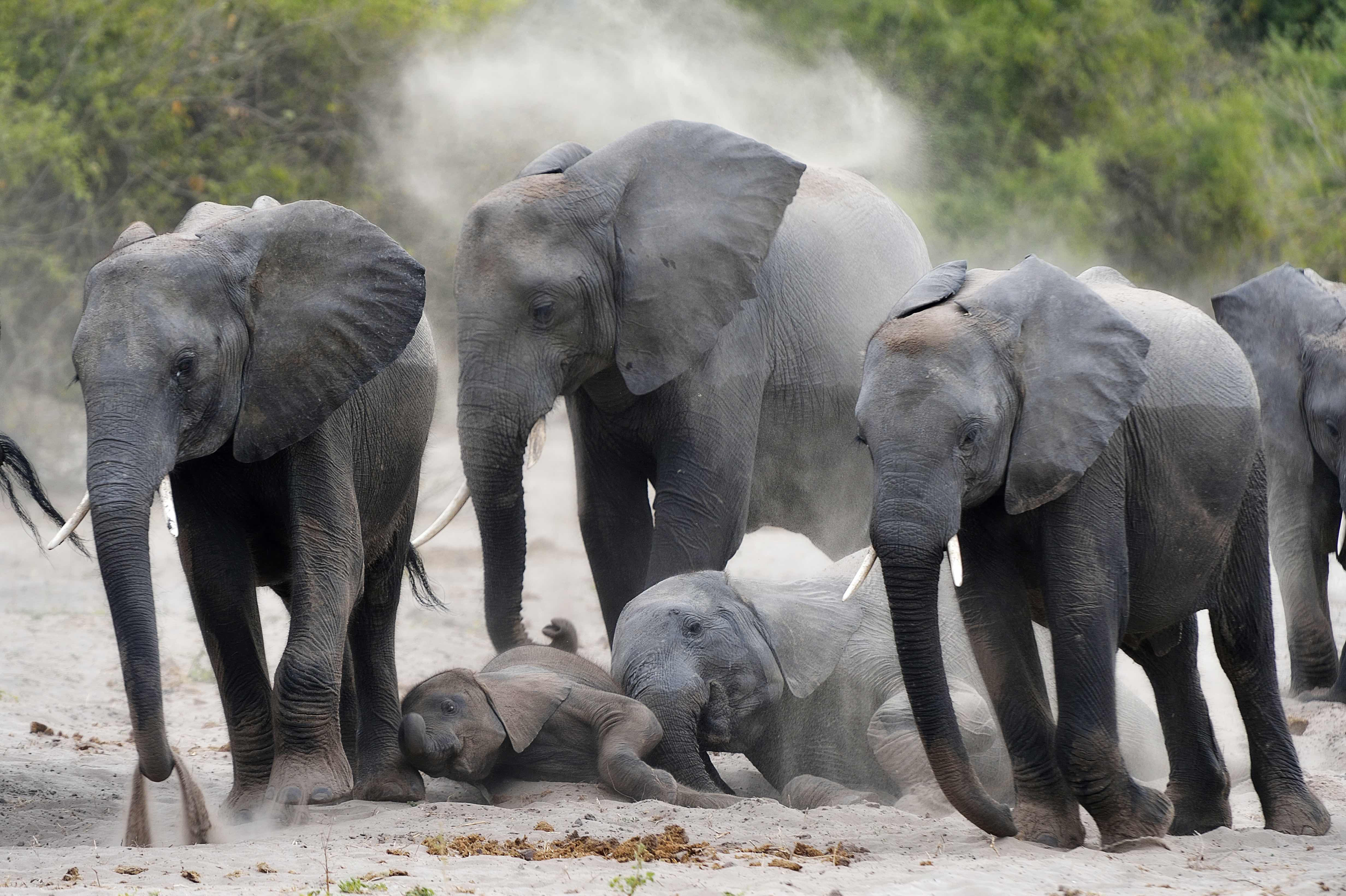Animal Rights Group Vows to Fight for CT Elephants in '18
An animal-rights group says it will continue fighting for the release of three Connecticut zoo elephants despite a Litchfield Superior Court ruling that denies standing for the petitioners.
January 02, 2018 at 02:29 PM
5 minute read

An animal-rights group says it will continue fighting for the release of three Connecticut zoo elephants despite a Litchfield Superior Court ruling that denies standing for the petitioners.
On Dec. 26, Judge James Bentivegna called the Nonhuman Rights Project's Nov. 13 writ of habeas petition “wholly frivolous,” rejecting the group's effort to represent elephants Beulah, Minnie and Karen to secure their release from the Commerford Zoo in Goshen to the Performing Animal Welfare Society in Galt, California.
“The petitioner in the present case naturally does not allege that it is a parent of any sort to the elephants,” Bentivegna wrote. “On the contrary, were the court to determine that the elephants are 'persons,' it is the respondents who are more akin to parents of Beulah, Minnie and Karen.” Bentivegna added that the NHRP had not demonstrated that it had a “significant relationship” with the animals that would justify standing in the case.
“Does the petitioner's theory that an elephant is a legal person entitled to those same liberties extended to you and I have a possibility or probability of victory?” Bentivegna wrote in his decision. “The petitioner is unable to point to any authority which has held so, but instead relies on basic human rights of freedom and equality, and points to expert averments of similarities between elephants and human beings as evidence that this court must forge new law. Based on the law as it stands today, this court cannot find so.”
The case is a loss for groups seeking to establish a precedent showing animals have standing to sue. One of the NHRP's stated objectives is “to change the common law status of great apes, elephants, dolphins, and whales from mere 'things,' which lack the capacity to possess any legal right, to 'legal persons,' who possess such fundamental rights as bodily liberty and bodily integrity.”
NHRP attorney and founding president Steven Wise responded in a written statement that the group will continue to pursue legal grounds to represent Beulah, Minnie and Karen, who it claims are kept “in deplorable conditions.”
“The NHRP had thought it plain that the three elephants have no significant relationships with any petitioner able to file a habeas corpus lawsuit on their behalf against their captors,” Wise stated. “We are also concerned that the Superior Court in its decision inappropriately analogized their captors at the Commerford Zoo to the elephants' parents. In each of its prior common law habeas corpus cases in which a court addressed standing, the NHRP has always been found to have standing. We are optimistic we will eventually be found to have standing in this case as well.”
Wise also questioned the ruling that NHRP's petition was frivolous “because no one had ever brought such a case before in Connecticut. We believe the court failed to consider the manner in which the common law has traditionally changed over the last 800 years. Each of the thousands of common law rules that exist today once did not exist.”
According to the NHRP, Beulah, also known as Beulah Mae, is an Asian elephant who was born in the wild in Myanmar in 1967 and imported to the United States sometime between 1969 and 1973. In 1973, she was sold to the Commerford Zoo. Minnie, also known as Mignon, is an Asian elephant who was born in the wild in Thailand and imported to the United States in 1972 when she was 2 months old. Karen is an African elephant who was born in the wild in 1981 in an unknown location. She was imported to the United States by Jurgen C. Schulz, who sold her to Commerford Zoo.
Recent rulings related to animal rights have also included U.S. District Judge William Orrick of the Northern District of California stating in 2016 that animals have no standing to assert copyright authorship under Ninth Circuit law. That decision involved a selfie taken by a crested macaque that quickly went viral.
The Ninth Circuit sounded no more receptive during a July 12 oral argument that led to a settlement. Under the deal, the photographer, whose camera was used to take the selfie, agreed to donate 25 percent of any future revenues from the images to charities dedicated to protecting the crested macaques in Indonesia.
The Commerford Zoo, which did not have an attorney, did not respond to a request for comment Dec. 29.
The Nonhuman Rights Project is represented by David Zabel, a principal with Cohen and Wolf in Bridgeport. Steven Wise was granted permission to appear in court pro hac vice, or as an attorney of record, despite being unlicensed in Connecticut, as he has done in previous cases.
This content has been archived. It is available through our partners, LexisNexis® and Bloomberg Law.
To view this content, please continue to their sites.
Not a Lexis Subscriber?
Subscribe Now
Not a Bloomberg Law Subscriber?
Subscribe Now
NOT FOR REPRINT
© 2025 ALM Global, LLC, All Rights Reserved. Request academic re-use from www.copyright.com. All other uses, submit a request to [email protected]. For more information visit Asset & Logo Licensing.
You Might Like
View All
Apple Disputes 'Efforts to Manufacture' Imaging Sensor Claims Against iPhone 15 Technology

New Partners at Cummings & Lockwood, Carmody Torrance Sandak & Hennessey
2 minute read

DOJ, 10 State AGs File Amended Antitrust Complaint Against RealPage and Big Landlords
4 minute readTrending Stories
Who Got The Work
Michael G. Bongiorno, Andrew Scott Dulberg and Elizabeth E. Driscoll from Wilmer Cutler Pickering Hale and Dorr have stepped in to represent Symbotic Inc., an A.I.-enabled technology platform that focuses on increasing supply chain efficiency, and other defendants in a pending shareholder derivative lawsuit. The case, filed Oct. 2 in Massachusetts District Court by the Brown Law Firm on behalf of Stephen Austen, accuses certain officers and directors of misleading investors in regard to Symbotic's potential for margin growth by failing to disclose that the company was not equipped to timely deploy its systems or manage expenses through project delays. The case, assigned to U.S. District Judge Nathaniel M. Gorton, is 1:24-cv-12522, Austen v. Cohen et al.
Who Got The Work
Edmund Polubinski and Marie Killmond of Davis Polk & Wardwell have entered appearances for data platform software development company MongoDB and other defendants in a pending shareholder derivative lawsuit. The action, filed Oct. 7 in New York Southern District Court by the Brown Law Firm, accuses the company's directors and/or officers of falsely expressing confidence in the company’s restructuring of its sales incentive plan and downplaying the severity of decreases in its upfront commitments. The case is 1:24-cv-07594, Roy v. Ittycheria et al.
Who Got The Work
Amy O. Bruchs and Kurt F. Ellison of Michael Best & Friedrich have entered appearances for Epic Systems Corp. in a pending employment discrimination lawsuit. The suit was filed Sept. 7 in Wisconsin Western District Court by Levine Eisberner LLC and Siri & Glimstad on behalf of a project manager who claims that he was wrongfully terminated after applying for a religious exemption to the defendant's COVID-19 vaccine mandate. The case, assigned to U.S. Magistrate Judge Anita Marie Boor, is 3:24-cv-00630, Secker, Nathan v. Epic Systems Corporation.
Who Got The Work
David X. Sullivan, Thomas J. Finn and Gregory A. Hall from McCarter & English have entered appearances for Sunrun Installation Services in a pending civil rights lawsuit. The complaint was filed Sept. 4 in Connecticut District Court by attorney Robert M. Berke on behalf of former employee George Edward Steins, who was arrested and charged with employing an unregistered home improvement salesperson. The complaint alleges that had Sunrun informed the Connecticut Department of Consumer Protection that the plaintiff's employment had ended in 2017 and that he no longer held Sunrun's home improvement contractor license, he would not have been hit with charges, which were dismissed in May 2024. The case, assigned to U.S. District Judge Jeffrey A. Meyer, is 3:24-cv-01423, Steins v. Sunrun, Inc. et al.
Who Got The Work
Greenberg Traurig shareholder Joshua L. Raskin has entered an appearance for boohoo.com UK Ltd. in a pending patent infringement lawsuit. The suit, filed Sept. 3 in Texas Eastern District Court by Rozier Hardt McDonough on behalf of Alto Dynamics, asserts five patents related to an online shopping platform. The case, assigned to U.S. District Judge Rodney Gilstrap, is 2:24-cv-00719, Alto Dynamics, LLC v. boohoo.com UK Limited.
Featured Firms
Law Offices of Gary Martin Hays & Associates, P.C.
(470) 294-1674
Law Offices of Mark E. Salomone
(857) 444-6468
Smith & Hassler
(713) 739-1250










